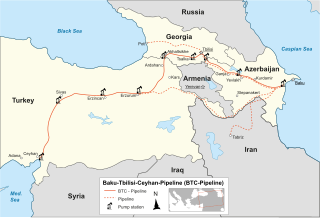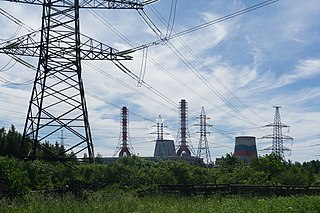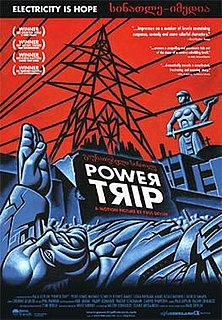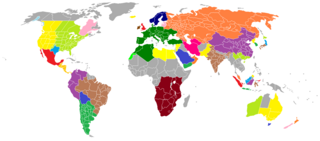
The economy of Georgia is an emerging free market economy. Its gross domestic product fell sharply following the dissolution of the Soviet Union but recovered in the mid-2000s, growing in double digits thanks to the economic and democratic reforms brought by the peaceful Rose Revolution. Georgia continued its economic progress since, "moving from a near-failed state in 2003 to a relatively well-functioning market economy in 2014". In 2007, the World Bank named Georgia the World's number one economic reformer, and has consistently ranked the country at the top of its ease of doing business index.

Tbilisi, in some languages still known by its pre-1936 name Tiflis, is the capital and the largest city of Georgia, lying on the banks of the Kura River with a population of approximately 1.5 million people. Tbilisi was founded in the 5th century AD by Vakhtang I of Iberia, and since then has served as the capital of various Georgian kingdoms and republics. Between 1801 and 1917, then part of the Russian Empire, Tiflis was the seat of the Caucasus Viceroyalty, governing both the northern and the southern parts of the Caucasus.

The Baku–Tbilisi–Ceyhan (BTC) pipeline is a 1,768 kilometres (1,099 mi) long crude oil pipeline from the Azeri–Chirag–Gunashli oil field in the Caspian Sea to the Mediterranean Sea. It connects Baku, the capital of Azerbaijan and Ceyhan, a port on the south-eastern Mediterranean coast of Turkey, via Tbilisi, the capital of Georgia. It is the second-longest oil pipeline in the former Soviet Union, after the Druzhba pipeline. The first oil that was pumped from the Baku end of the pipeline reached Ceyhan on 28 May 2006.

OAO RAO UES was an electric power holding company in Russia. It controlled about 70% of Russia's installed electric capacity, 96% of its high-voltage grid and over 70% of its transmission lines. In addition to the Russian market, RAO UES exported electricity to Scandinavia and to other members of the CIS. The last head of RAO UES was Anatoly Chubais.

OGK-3 was a Russian power company. The stock was traded on the MICEX-RTS stock exchange.

Irkutskenergo is a power company in Russia. It mainly focus on the generation of hydroelectricity.

Russia's energy policy which is set out in the government's Energy Strategy document, first approved in 2000, which sets out the government's policy to 2020. The Energy Strategy outlines several key priorities: an increase in energy efficiency, reducing the impact on the environment, sustainable development, energy development and technological development, as well as improved effectiveness and competitiveness. Greenhouse gas emissions by Russia are large because of its energy policy.

Kuchurgan power station is the largest power station of Moldova, located in Dnestrovsc, Transnistria, on the shores of Lake Cuciurgani bordering Ukraine. It was commissioned on 26 September 1964 and produces about 83% of Moldova's electricity.

Joint Stock Company Inter RAO UES, traded as, is a diversified energy holding company headquartered in Moscow, Russia. Its business includes power and heat generation, electricity supply, international energy trading, engineering, design and development of electric power infrastructure. In addition to its assets in Russia it controls several energy companies outside Russia including thermal and hydro power plants, grid operators and energy traders. It holds a monopoly on the export and import of electricity in Russia.

North-West Thermal Power Plant is a cogeneration power station (TETs) in Saint-Petersburg, owned by Inter RAO UES. This is a first power station in Russia to use combined cycle.

Power Trip is a documentary film by director Paul Devlin that describes the electricity crisis in the country of Georgia several years after the fall of the Soviet Union. In 1999, Georgia's government sold the electric utility company Telasi to AES Corporation, a multinational company headquartered in Virginia. The film follows several AES-Telasi employees as the company tries to turn a profit and ensure that power is consistently available to customers in the face of widespread corruption and failure to pay electricity bills by both commercial and residential customers. According to AES-Telasi staff, 90% of customers were not paying for electricity when the company took over, partly because salaries were extremely low and partly because during the Soviet era, the state had provided free electricity. The film shows many shocking pictures of illegal wiring that people rigged up to steal electricity from buildings with power, creating serious safety hazards and straining the power grid. Government corruption ensured that some companies received electricity even if they did not pay for it for years. The film looks at the chaos and riots that occurred in Tbilisi after AES-Telasi started cutting off electricity to customers with unpaid bills. The film exposes corruption in the highest levels of government as well as the plight of the Georgian people as they struggle for power. The film ends by noting that AES Corporation, having spent many tens of millions of dollars yet with profitability nowhere in sight, sold Telasi to a Russian company.
OAO FGC UES is a state-owned energy company located in Moscow, Russia. It is the country's largest transmission grid company. The company is listed at the Moscow and London stock exchanges with 80.13% of shares owned by Rosseti.

The First Generation Company of the Wholesale Electricity Market (OGK-1) was a large Russian company formed by the merger of six electricity generation companies.

Georgian Railway LLC is the national railway company of Georgia.

The IPS/UPS is a wide area synchronous transmission grid of some CIS countries with a common mode of operation and centralized supervisory control. It has an installed generation capacity of 300 gigawatts, and produces 1,200 terawatt-hours (TWh) per year for its 280 million customers. The system spans eight time zones.

Sangtuda 1 Hydroelectric Power Plant is a hydroelectric power plant, located on the Vakhsh River in Tajikistan. Construction commenced during the Soviet period in the 1980s, but halted in the beginning of the 1990s due to lack of financing when the station was about 20% complete. An agreement with Russia allowed to restart the construction, with four units entering service in 2008–2009. The plant was officially commissioned on 31 July 2009. Once working at full capacity, the plant will provide around 12% of Tajikistan's electricity output.

The Dzuarikau–Tskhinvali pipeline is a natural gas pipeline running from the village of Dzuarikau in North Ossetia to Tskhinvali, South Ossetia. Construction started in 2006, and gas supplies started in September 2009.
OJSC Bashkirenergo was a power and heat company operating in Bashkortostan, Russia. The major shareholder of the company is a holding company Sistema. 21.27% of shares is owned by the Russian grid company FGC UES.

Russia is the fourth largest generator and consumer of electricity in the world. Its 440 power stations have a combined installed generation capacity of 220 GW.
Electric Yerevan, also known within Armenia as No to Robbery protests, were mass protests which occurred in the summer of 2015 against a 17% hike in electricity rates within Armenia. The protests were successful in reversing the price hike and causing the sale of Electric Networks of Armenia from Inter RAO to the Tashir Group.

















